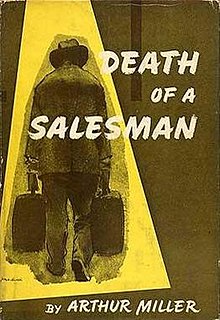
Have you ever thought about the future- what you plan to be and how you plan to get there? Well, unfortunately, this book puts a sad twist to the future and paints it in a gloomy way.
Willy Loman, your typical, average man, is down on his luck. He isn’t getting enough salary even though he has been with his company for 35 years, despite his brother in law being in a different company for the same length of time, and somehow is so much richer than him. While his son hates him, Willy sometimes blames it on his son’s laziness, and the other times the fact that his son is working too hard and doesn’t know what he wants.
So what does he do? Well, he’s a traveling salesman, so he sells the only thing he has left. Guess.
There are a couple of things to note about this novel. First, it’s a play, so the dialogue is easy to stand out, and one can know who’s talking. And thankfully, unlike Shakespeare’s plays, this play is only two acts long, which was just over a hundred pages in the copy I had, so it was easy to read.
Second, the theme. I won’t even talk about the fact that the author considers the American Dream fading, or even his interpretation of capitalism. No, I will instead talk about the other characters. Willy’s wife, Linda Loman, is down on her luck too, as although she gives Willy everything, including her undying loyalty no matter what he does, he still treats her without love. The son that hates Willy, Biff, is just a man like us teenagers (except he’s 34) that tries to talk to Willy, but gives up because Willy wouldn’t listen to him. And Willy’s second son, who is often forgotten about by Willy, has to face abandonment issues not only from his father, but from his mother too, in which not even him saying that he was getting married made them happy.
Overall, Miller claims that we all know a Willy Loman, and although his story ends in tragedy, it does not have to be this way for us.
-Megan V, 12th grade
Arthur Miller’s Death of a Salesman is available for checkout from the Mission Viejo Library.
 This book was far too drawn out. In the beginning, the event of when both Amy and Dee got kidnapped by the same man was interesting. Not only was Dee the only one the man wanted, but additionally the kidnapper, Kyle, didn’t treat either Amy or Dee with respect, and ultimately hit Amy day on, and raped Dee.
This book was far too drawn out. In the beginning, the event of when both Amy and Dee got kidnapped by the same man was interesting. Not only was Dee the only one the man wanted, but additionally the kidnapper, Kyle, didn’t treat either Amy or Dee with respect, and ultimately hit Amy day on, and raped Dee.
 For anyone, whether or not you are a James Patterson fan, Expelled is not a disappointment. When four students are expelled over a posted picture, they must team up, whether they like it or not. They have to make decisions on who they can trust, in a world of guilty and innocents. But who are the true guilty and innocent people? You can’t make your decisions on looks and past events. Theo Foster was expelled for a posted photo on his Twitter account. He wants to find out who framed him, but where can he start, the people in the photo? His friends? Every single person in the school?
For anyone, whether or not you are a James Patterson fan, Expelled is not a disappointment. When four students are expelled over a posted picture, they must team up, whether they like it or not. They have to make decisions on who they can trust, in a world of guilty and innocents. But who are the true guilty and innocent people? You can’t make your decisions on looks and past events. Theo Foster was expelled for a posted photo on his Twitter account. He wants to find out who framed him, but where can he start, the people in the photo? His friends? Every single person in the school?





